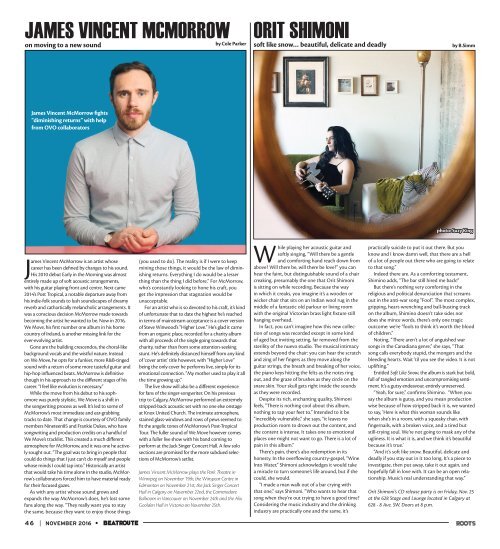BeatRoute Magazine Alberta print e-edition - November 2016
BeatRoute Magazine is a monthly arts and entertainment paper with a predominant focus on music – local, independent or otherwise. The paper started in June 2004 and continues to provide a healthy dose of perversity while exercising rock ‘n’ roll ethics.
BeatRoute Magazine is a monthly arts and entertainment paper with a predominant focus on music – local, independent or otherwise. The paper started in June 2004 and continues to provide a healthy dose of perversity while exercising rock ‘n’ roll ethics.
Create successful ePaper yourself
Turn your PDF publications into a flip-book with our unique Google optimized e-Paper software.
JAMES VINCENT MCMORROW<br />
on moving to a new sound by Cole Parker<br />
ORIT<br />
SHIMONI<br />
soft like snow… beautiful, delicate and deadly<br />
by B.Simm<br />
James Vincent McMorrow fights<br />
“diminishing returns” with help<br />
from OVO collaborators<br />
photo: Suzy King<br />
James Vincent McMorrow is an artist whose<br />
career has been defined by changes to his sound.<br />
His 2010 debut Early in the Morning was almost<br />
entirely made up of soft acoustic arrangements,<br />
with his guitar playing front and centre. Next came<br />
2014’s Post Tropical, a notable departure away from<br />
his indie-folk sounds to lush soundscapes of dreamy<br />
reverb and cathartically melancholic arrangements. It<br />
was a conscious decision McMorrow made towards<br />
becoming the artist he wanted to be. Now in <strong>2016</strong>,<br />
We Move, his first number one album in his home<br />
country of Ireland, is another missing link for the<br />
ever-evolving artist.<br />
Gone are the building crescendos, the choral-like<br />
background vocals and the wistful nature. Instead<br />
on We Move, he opts for a funkier, more R&B-tinged<br />
sound with a return of some more tasteful guitar and<br />
hip-hop influenced beats. McMorrow is definitive<br />
though in his approach to the different stages of his<br />
career. “I feel like evolution is necessary.”<br />
While the move from his debut to his sophomore<br />
was purely stylistic, We Move is a shift in<br />
the songwriting process as well. It’s led to some of<br />
McMorrow’s most immediate and ear-grabbing<br />
tracks to date. That change is courtesy of OVO family<br />
members Nineteen85 and Frankie Dukes, who have<br />
songwriting and production credits on a handful of<br />
We Move’s tracklist. This created a much different<br />
atmosphere for McMorrow, and it was one he actively<br />
sought out. “The goal was to bring in people that<br />
could do things that I just can’t do myself and people<br />
whose minds I could tap into.” Historically an artist<br />
that would take his time alone in the studio, McMorrow’s<br />
collaborators forced him to have material ready<br />
for their focused gazes.<br />
As with any artist whose sound grows and<br />
expands the way McMorrow’s does, he’s lost some<br />
fans along the way. “They really want you to stay<br />
the same, because they want to enjoy those things<br />
(you used to do). The reality is if I were to keep<br />
mining those things, it would be the law of diminishing<br />
returns. Everything I do would be a lesser<br />
thing than the thing I did before.” For McMorrow,<br />
who’s constantly looking to hone his craft, you<br />
get the impression that stagnation would be<br />
unacceptable.<br />
For an artist who is so devoted to his craft, it’s kind<br />
of unfortunate that to date the highest he’s reached<br />
in terms of mainstream acceptance is a cover version<br />
of Steve Winwood’s “Higher Love.” He’s glad it came<br />
from an organic place, recorded for a charity album<br />
with all proceeds of the single going towards that<br />
charity, rather than from some attention-seeking<br />
stunt. He’s definitely distanced himself from any kind<br />
of ‘cover artist’ title however, with “Higher Love”<br />
being the only cover he performs live, simply for its<br />
emotional connection. “My mother used to play it all<br />
the time growing up.”<br />
The live show will also be a different experience<br />
for fans of the singer-songwriter. On his previous<br />
trip to Calgary, McMorrow performed an extremely<br />
stripped-back acoustic set with no one else onstage<br />
at Knox United Church. The intimate atmosphere,<br />
stained glass-windows and rows of pews seemed to<br />
fit the angelic tones of McMorrow’s Post-Tropical<br />
Tour. The fuller sound of We Move however comes<br />
with a fuller live show with his band coming to<br />
perform at the Jack Singer Concert Hall. A few solo<br />
sections are promised for the more subdued selections<br />
of McMorrow’s setlist.<br />
James Vincent McMorrow plays the Park Theatre in<br />
Winnipeg on <strong>November</strong> 19th, the Winspear Centre in<br />
Edmonton on <strong>November</strong> 21st, the Jack Singer Concert<br />
Hall in Calgary on <strong>November</strong> 22nd, the Commodore<br />
Ballroom in Vancouver on <strong>November</strong> 24th and the Alix<br />
Goolden Hall in Victoria on <strong>November</strong> 25th.<br />
While playing her acoustic guitar and<br />
softly singing, “Will there be a gentle<br />
and comforting hand reach down from<br />
above? Will there be, will there be love?” you can<br />
hear the faint, but distinguishable sound of a chair<br />
creaking, presumably the one that Orit Shimoni<br />
is sitting on while recording. Because the way<br />
in which it creaks, you imagine it’s a wooden or<br />
wicker chair that sits on an Indian wool rug in the<br />
middle of a fantastic old parlour or living room<br />
with the original Victorian brass light fixture still<br />
hanging overhead.<br />
In fact, you can’t imagine how this new collection<br />
of songs was recorded except in some kind<br />
of aged but inviting setting, far removed from the<br />
sterility of the nuevo studio. The musical intimacy<br />
extends beyond the chair: you can hear the scratch<br />
and zing of her fingers as they move along the<br />
guitar strings, the breath and breaking of her voice,<br />
the piano keys hitting the felts as the notes ring<br />
out, and the graze of brushes as they circle on the<br />
snare skin. Your skull gets right inside the sounds<br />
as they were recorded.<br />
Despite its rich, enchanting quality, Shimoni<br />
feels, “There is nothing cool about this album,<br />
nothing to tap your feet to.” Intended to it be<br />
“incredibly vulnerable,” she says, “it leaves no<br />
production room to drown out the content, and<br />
the content is intense. It takes one to emotional<br />
places one might not want to go. There is a lot of<br />
pain in this album.”<br />
There’s pain, there’s also redemption in its<br />
honesty. In the overflowing country-gospel, “Wine<br />
Into Water,” Shimoni acknowledges it would take<br />
a miracle to turn someone’s life around, but if she<br />
could, she would.<br />
“I made a man walk out of a bar crying with<br />
that one,” says Shimoni. “Who wants to hear that<br />
song when they’re out trying to have a good time?<br />
Considering the music industry and the drinking<br />
industry are practically one and the same, it’s<br />
practically suicide to put it out there. But you<br />
know and I know damn well, that there are a hell<br />
of a lot of people out there who are going to relate<br />
to that song.”<br />
Indeed there are. As a comforting testament,<br />
Shimino adds, “The bar still hired me back!”<br />
But there’s nothing very comforting in the<br />
religious and political denunciation that screams<br />
out in the anti-war song “Fool”. The most complex,<br />
gripping, heart-wrenching and ball-busting track<br />
on the album, Shimino doesn’t take sides nor<br />
does she mince words, there’s only one tragic<br />
outcome: we’re “fools to think it’s worth the blood<br />
of children.”<br />
Noting, “There aren’t a lot of anguished war<br />
songs in the Canadiana genre,” she says, “That<br />
song calls everybody stupid, the mongers and the<br />
bleeding hearts. Wait ‘til you see the video. It is not<br />
uplifting.”<br />
Entitled Soft Like Snow, the album is stark but bold,<br />
full of tangled emotion and uncompromising sentiment.<br />
It’s a gutsy endeavour, entirely unreserved.<br />
“Yeah, for sure,” confirms Shimino. “When you<br />
say the album is gutsy, and you mean production<br />
wise because of how stripped back it is, we wanted<br />
to say, ‘Here is what this woman sounds like<br />
when she’s in a room, with a squeaky chair, with<br />
fingernails, with a broken voice, and a tired but<br />
still-trying soul. We’re not going to mask any of the<br />
ugliness. It is what it is, and we think it’s beautiful<br />
because it’s true.’<br />
“And it’s soft like snow. Beautiful, delicate and<br />
deadly if you stay out in it too long. It’s a piece to<br />
investigate, then put away, take it out again, and<br />
hopefully fall in love with. It can be an open relationship.<br />
Music’s real understanding that way.”<br />
Orit Shimoni’s CD release party is on Friday, Nov. 25<br />
at the 628 Stage and Lounge located in Calgary at<br />
628 - 8 Ave. SW. Doors at 8 p.m.<br />
46 | NOVEMBER <strong>2016</strong> • BEATROUTE ROOTS


















